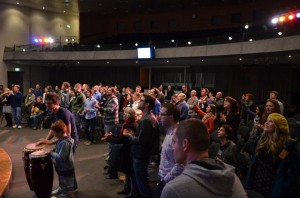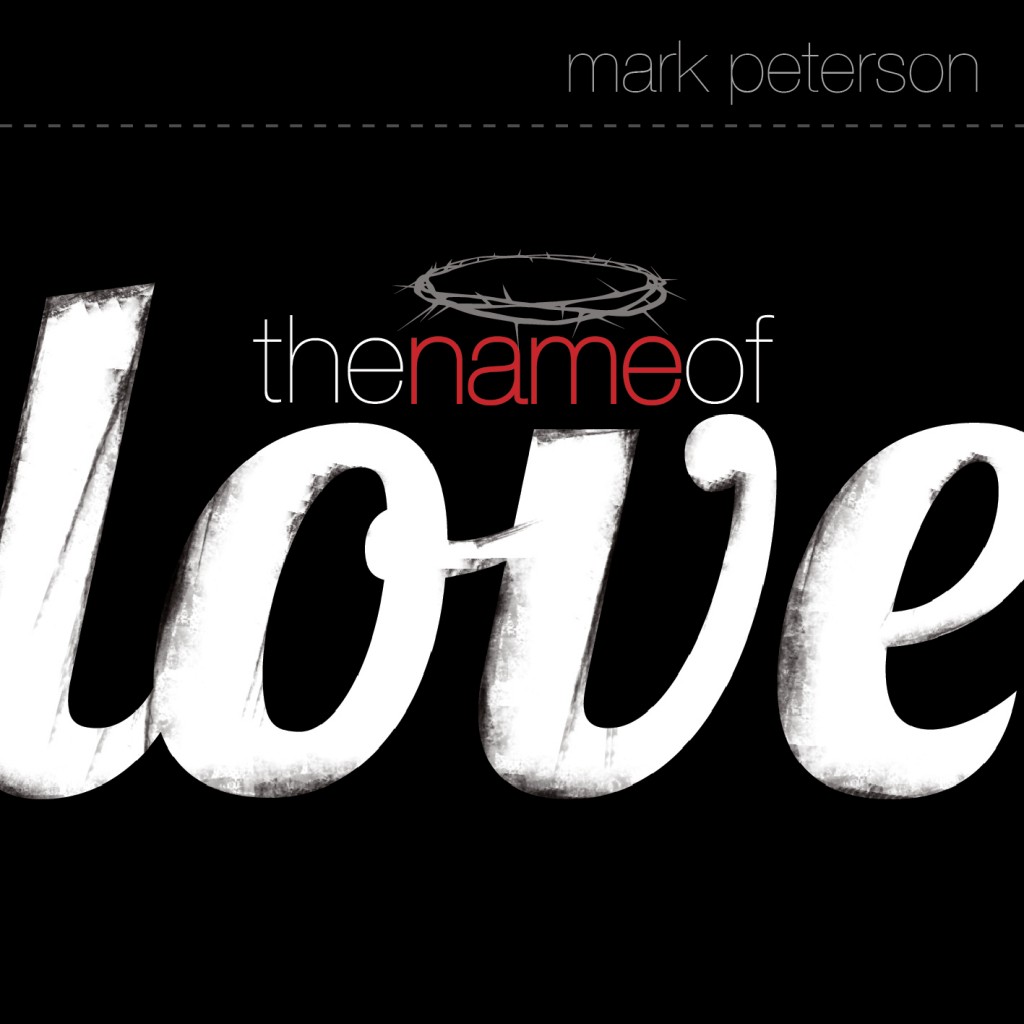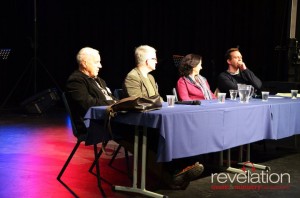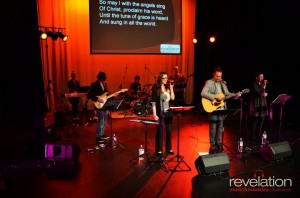 Perhaps provocatively, I would like to talk about boring church services. You may therefore feel nervous about forwarding it on to your pastor! Please assure them that I’m not pointing the finger at any church or church leader… For the record, I find my own church to be a mixture: sometimes our services are sharp and engaging, other times less so. And I’m forwarding this to our pastors too, in a spirit of robust, loving encouragement!
Perhaps provocatively, I would like to talk about boring church services. You may therefore feel nervous about forwarding it on to your pastor! Please assure them that I’m not pointing the finger at any church or church leader… For the record, I find my own church to be a mixture: sometimes our services are sharp and engaging, other times less so. And I’m forwarding this to our pastors too, in a spirit of robust, loving encouragement!
Getting music right can surely play a part in reducing boredom, as can understanding the culture well, having a great welcoming process, and having gifted people on the platform.
I’m sure there are plenty of suggestions that astute people have made over the years for how to grab the attention of the gathered folk, hold it for an hour or so, and then promise it again for the following Sunday.
Some churches try technology. Others try winsome, charismatic leadership style. One pastor who is a good friend of mine has in his service plans a column for something unusual every week, just to make sure he keeps it interesting.
But although these various initiatives can be a great way of loving our people, I’m not sure these are in themselves the solution. I think there are deeper issues at stake.
I now refer briefly to my background for some context. I belong to the Reformed Evangelical arm of the Anglican Church here in Australia. I grew up in Sydney as the son of an Anglican minister and studied theology at Moore College for 4 years. I’ve been in full time ministry now for 9 years at Holy Trinity Adelaide as the music minister, and have no particular urge to move to any other church or denomination. I don’t think we’re the best or worst denomination, but neither do I think that matters. I have a heritage amongst people whom I love and respect deeply, though I also have many friends in other denominations or churches with other styles.
I provide this detail because readers from different backgrounds will tend to have a different experience of church services, and of the efforts that have been made to make them interesting.
I often hear people say they wish they could find a church that has Reformed Evangelical Anglican (REA) preaching with a Hillsong version of music and service structure. “What a combo,” they say.
I’m not convinced. That implies that REAs have preaching worked out and Hillsong has music worked out. Don’t get me wrong: I think we can all learn from each other. It’s just that I’m looking for something deeper than comparison or benchmarking.
So at this point, I want to try to clarify what I think the question is.
My title suggests that boredom is an issue in church. But you know, we are flawed creatures, and even if the Lord himself had visited us during his earthly ministry, we would still have been likely to drift off because of the weakness of our flesh. We get sleepy; our worldly interests still tug at our hearts; we haven’t got a vision of Christ in his full sin-smashing glory.
So maybe boredom isn’t quite the precise category we’re looking for, since it often says more about those of us in the pew than about the program being delivered from the platform. But there is a biblical category that governs what we should be doing in church, and that is edification.
Now this sounds less exciting than my title, but perhaps the question is simply, “Are our services edifying?” The problem here is that the term “edifying” has fallen down a crevice between a vapid, inoffensive word to describe positive learning experiences (e.g. “that movie was marginally edifying but not particularly exciting”) and a technical theological term that ministers use rather vaguely and unconvincingly (e.g. “I hope my sermon today edified you in some helpful way”).
What I will seek to do in this 4 part series of blogs is to try to say some things about edification in the gathering and what our role is (those involved in planning or running services) in trying to bring it about. I’m not going to do an extensive survey of New Testament usage, but rather focus on broader biblical principles and a few key texts.
The first of these relevant biblical principles is worship.
Where we find ourselves
I refer again to my REA background. In my stable, I think many of us (including myself) have become very hesitant to use the word worship to describe what we are doing in a church service. This is because our “whole of Bible” understanding of worship has rightly pointed us towards worship as a “whole of life” activity, not simply the activities that we undertake in church.
Let me list some of the things we’ve reacted against. We have reacted against the reducing of worship to congregational singing when it has so much more of a wide scope than this. We’ve reacted against the use of the term ‘worship leader’ to describe the song leader when the preacher is at least as eligible for that description, if not anyone up the front urging people to submit their lives to God. We’ve reacted against the confusing idea that expressing worship is primarily about expressing feelings… we would agree that feelings associated with our awe of God are a natural by-product of worship, but we’ve insisted that they are not its essence.
However, I think we’ve seen an over-reaction to this imprecise word usage that has had wide and deep implications for the way we run our services. In our reluctance to describe the activities of our gatherings as worship, we have found ourselves without an adequate vocabulary to describe the vertical or God-ward aspects of our meetings. As a result, those God-ward aspects have often been pushed aside. We’ve picked up the New Testament’s emphasis on edification when we meet, and tended to focus more on the horizontal aspects of our meetings. But somehow in doing this, I think we’ve created a division between worship and edification, and here is the nub of the problem.
I have found myself asking, “What exactly is edification?” I realise it’s the idea of building… that we are built up into Christ. It’s the idea of Christians becoming stronger and more numerous.
But the problem is, often the attempts to edify me fail. I was once taught that singing in church was for my encouragement, and yet I usually felt sapped by it. In fact, one of the reasons I went into formal music ministry was that so much church music made me feel discouraged. I couldn’t just sit around and complain about it – I felt I had to do something.
So how does the church get built? It’s by the strengthening of individuals and by the adding of people into it. 2 parts to this I guess: the Christians and the soon-to-become-Christians.
Strengthening the Church by strengthening insiders
For Christians to be strengthened, the Bible has a few ideas. In Paul’s letters, as in other parts, there is the very common indicative-imperative pattern. Things are said in the indicative mood (describing), indicating the grace of God, the plan of God or the glory of Christ. These are then followed by the imperative (instructions or appeals), calling us to adapt our behaviour or our thinking. Paul doesn’t tend to give out rules – mostly just implications. If we knew just how much we were loved, we’d love in return. If we knew the spiritual reality of being in Christ, we would act in Christ and not in a fleshly way. And so on.
Edification is always grace driven. It’s always driven by the character of God or a description of the work of God. And here is a key point: to be edified, we need to be drawn to God himself.
We see this in the book of Hebrews as well, where a series of warning passages are alternated with a series of passages persuading the reader/hearer of Christ’s incomparable glory, and of the manner in which the new covenant in Jesus stupendously surpasses the old. The key thing is that these words of edification and encouragement to Christians are interwoven with words of praise and acclamation.
Before I go any further, let me say that the alternative is a very dangerous path. God has saved us by grace, through faith alone, not by works, so that no-one can boast. If we slip into preaching sermons and running services that for some reason have lost their grace mooring, then they potentially lead people into falsehood. We can unwittingly preach about the importance of evangelism, or the need to stop sinning, or the putting on of virtues, without couching these in the terms of response. Every good deed must be a response to God’s gracious work, or I’d argue that it’s not actually a good deed but an attempt to win God’s favour through our own merit.
I should also say that the majority of the time, our failure in this is unintentional… I think! Those who have the privilege of ministering from the platform in a church are usually very clear in their heads about the grace-driven nature of our faith, and perhaps we make assumptions about the people in the seats.
We get a sense that people need to be reminded to share their faith and so we create a program or a timetable. We ask people to sign up to things or attend events, and our meetings can start to feel like a campaign meeting in a political party.
We kick off the year with all sorts of new structures, goals and targets that we’re sure will be a vehicle for God’s blessing, and we present them to the congregation much like you might present at an organisation’s Annual General Meeting.
We know that we need to pray to God for our people and our ministries, so we list them off to him much like we’re placing an order at a drive-through window.
I have no doubt that these things are all well intended. But what I feel is missing when we do this… is worship. Call it what you will: I don’t mind if you call it a God-focus or a grace motivation. What matters is that we never make assumptions about how the church is strengthened. It is only in God that people are edified.
So how might it look to shape our meetings to be services of worship? I think that the time when we gather together as Christ’s people to sit under his word is specifically a time of worship. That is, it is a time when we enact our submission to Christ’s lordship in some very particular ways: we sit under his word (which is a first order act of worship), we respond to him in words of faith and repentance, we sing and say together words of praise and thanksgiving, directed both to him and to each other, and through all of these things we remind each other of the kingdom and its implications for our lives.
Now we can have strategy and planning meetings, we can set aside time in the week to review our approach and make improvements. We can have fun times chatting about interests we might have in common other than the kingdom of God. But there must be a time in our week dedicated to those activities at the end of the previous paragraph.
This time of worship will actually provide the greatest edification of your entire week. But if it is watered down to just a meeting of like minded people, then it runs the very high risk of losing its God-ward focus, and therefore not being as edifying for people. The church struggles to grow because its message becomes like that of the advertisers… yet another appeal for our time, money and energy.
What about the 3 examples above… can they still be done in a service of worship? Yes. The first related to evangelism. But if you want people to evangelise (I run the risk of giving the false impression of being an expert here), you need to proclaim to those around you the glory, love, mercy, wisdom, power and holiness of God as revealed in Christ, and challenge people about whether this message has transformed them. I would much prefer it if that was the bulk of what was communicated in the service, and that the particular details of the strategy were referred to concisely, not in detail.
I’d say the same with our structures, goals and targets. Hand out a document if you like. But use the time in the service to draw people’s minds yet again to some aspect of God’s glory and grace that will make them excited to read your document!
With the example of prayer above, this is something that people could take onboard for leading prayers in the service or in a home group, or even in their private devotions. Here’s the thing: I struggle to find a prayer in the entire Bible that doesn’t keep making references to God and his wonderful wisdom, mercy and strength. If we could see clearly with our eyes who it was that we were addressing, we would just find ourselves compelled to refer to him and to what he has done and is doing. All prayer should be expressions of our worship… not in a high and righteous tone – he is our loving heavenly Father as well as our Sovereign Lord – but in the deep respect and awe of him who holds our lives and livelihoods in the palm of his hand.
Strengthening the Church by adding outsiders
Now briefly, the soon-to-become-Christians in our church services: I suggested that the church is built by people becoming Christians, as much as it is built by our worship bringing conviction to those who are already believers.
The clearest Biblical example of this type of conversion is in 1 Corinthians 14:21-25. Paul is arguing in this chapter that prophesy is more useful in the church than tongues, since the unintelligibility of tongues usually only enables a person to have an individual communication with God, whereas prophesy enables shared communication which can strengthen others. In verse 21-22 he even suggests that tongues are a sign of judgement for the unbeliever… yet prophesy is a sign for the believers. But although prophesy is for believers, there is a circumstance in which it can be for unbelievers, and this is when they witness it happening among Christians.
I won’t go into the discussion of precisely what Paul means by prophesy, other than to say that it is words prompted by God for the uplifting of believers.
But an unbeliever enters our meeting, hears the word of God intended to make strong the believer, and is personally convicted and called to account. “The secrets of his heart are disclosed, and so, falling on his face, he will worship God and declare that God is really among you”.
So, through our edification can come evangelism. I think this happens every Sunday in every city, although some definitions of prophesy would lead some to disagree in relation to prophesy… but perhaps agree in the general sense that powerful edifying words lead outsiders who are listening in to join us in worship.
That is, a person becoming a Christian is joining the worshipping activity that the church is already engaged in. I don’t think Paul is implying that the brand new believer is the only person in the room who is worshipping and falling on his face. He (or she) is joining in the worship undertaken by God’s people. We get a glimpse of the church at worship in a passing reference in Acts 13:2.
This bringing to worship through edification is helpful as we plan and lead our gatherings. I think we feel like we need to jazz it up at church. We do get bored… sometimes just because of our flesh. But is it possible that we are feeling an urge to use whatever techniques we can to make our meetings count, week by week? Are we unwittingly drawing techniques and methods from the creation rather than from the creator?
God is after all the life of the party. The church is the place to which the world can come to meet this God. But sometimes I feel that, rather than inviting him to the party, we’re just skyping him in.
Biblically speaking, wherever people encounter God in his glory, worship follows. Think of Moses told to remove his sandals whilst standing on holy ground – an act of submission and awe that God required of this not-yet-ready saviour for Israel. Think of Isaiah’s vision of God in which he calls out “woe is me for I am lost; I am a man of unclean lips… and my eyes have seen the King, the Lord of hosts”. God’s presence demands his utmost humbling. Think of the disciples who when they saw the risen Christ on the mountain worshipped him, “although some doubted”, reminding us that worship is not some triumphant act of super-spirituality. In each of these instances, worship is the humble surrender to God in the acknowledgement that he is all in all.
This is the God whom we present to the world when we meet for our church services. Yes, people will see us during the week showing a Godlike love. But when they visit us on a Sunday, it must all become clear to them! They should encounter God as he is, hearing his word powerfully proclaimed in speech and song, seeing people’s response of worship in their engagement, humility and deep love of God. And they should smell the aroma of this beautiful message about Christ. And so through our worship, they can meet God.
I hope to spell out a bit more detail of what I think Biblically edifying services can look like over the next 3 blogs. In the next one, I want to look at the idea of drama or gravitas and how God uses this to draw us to himself.
*****
Extended Footnote: a definition of worship (and some key texts)
Although the doctrine of worship is not simple, I do think it can be described simply as the expression of our humble submission to God.
But a bit more detail: Jesus preached “the Kingdom of God is at hand, repent and believe the gospel” (Mark 1:15). This message is foundational to understanding worship: Jesus’ coming was about the establishment of a kingdom. A kingdom means a king and worshipping subjects. The particular response to that news of a kingdom was about how to become one of these worshipping subjects: turn from sin to God and believe the gospel about Jesus.
In John’s Gospel, Jesus fills this out a little more when he says that true worshippers will worship in Spirit and in Truth (John 4:23-24), indicating that it is through the work of the Spirit of God and the Son of God that people would be enabled to worship.
In summary, to be one of the worshipping subjects of the King, you need to repent and believe: you need salvation that God has brought us through Christ and implanted in our hearts by his Holy Spirit. And worship is living out that salvation daily, in reverence, submission and service.
It’s really important to see that true worship isn’t initiated by human beings. It is made possible by God himself, through the gospel of Jesus Christ. So worship is one of the very characteristics of being a Christian.
One of the places Paul refers to worship in the Christian life is in Romans 12:1, where he says that the presenting of our bodies as living sacrifices, holy and acceptable to God, is our spiritual worship. This underlines the manner in which our whole life is submitted to him in service as an act of worship. He makes reference to the old system of worship – the official sacrificial system of the Mosaic Law – and shows how for Christians this is fulfilled by presenting our bodies for service.
Whilst Romans 12:1 is a key text, it is not an exhaustive text. For example, we shouldn’t assume that the sacrificial system was the only aspect of Old Testament worship – worship was all-of-life for Israel too. Many sections of the New Testament are devoted to clarifying how the Law was relevant and not relevant under the new covenant, and this is one of them.
Hebrews 12:18-29 particularly helps to show how worship now focuses on the heavenly Jerusalem, rather than around Mt Sinai or on the earthly Mt Zion. Our orientation should now be the heavenly glory of Christ, rather than the glory seen on earth by Moses. So the kingdom that Jesus was proclaiming in Mark’s Gospel has now been established, since the king has been enthroned and there are thousands of worshipping subjects, referred to as the “assembly of the firstborn who are enrolled in heaven”.
God is described as a “consuming fire” and therefore we are to “offer to God acceptable worship, with reverence and awe”.
It’s important to note that the words that follow on immediately after this are about love, respect and church life in general. So the writer wants us to maintain both the heavenly view of Christ’s exalted glory and the earthly view of day-to-day life in the church. I think it’s fair to say that it is this vision of the glory of the exalted Christ that empowers us to serve in the seemingly less glorious ways of respecting leaders and remaining pure.
Finally, the New Testament’s picture of worship is shaped by John’s vision in Revelation. Several texts outline the eternal worship of the church as it gathers to offer reverence, submission and service to God, such as Rev 5:8-10, 5:11-14, 7:9-12, 15:2-4, 19:6-8.
This is the picture of the end – the shaking of all things that will finally establish the unfettered rule of Christ the King. And our doctrine of Church today should affirm that we manifest this reality now, even though it is a future reality. The New Testament writers are at pains to state that we are with Christ in heaven, “seated with him” and so on.
In particular, as I’ve stated above, when people see our good deeds and come seeking God, it is in the church that they will find him. They should find a worshipping community. But fundamentally, where they find a worshipping community, they should indeed find… God!
Now although worship involves a horizontal component (e.g. Rom 12:1, Heb 13:1), it must also involve a vertical component by definition. There is no such thing as worship without a vertical component.
Peter actually makes this point very clearly in 1 Peter 4:10-11, where he says that whoever serves should do so in the strength that God supplies “in order that, in everything, God may be glorified through Jesus Christ”. That is, the reason we serve others is because we worship God. Worship, or bringing glory to God through Christ, is the driving motivation for all godliness.
So the church is the open community of worshipping subjects in the Kingdom of God. It is most visibly the dwelling place of God when we gather together physically. We seek to display the glorified Christ through our worship, which both strengthens the believer and draws into eternal life the unbeliever.

 The Name of Love is my 4th solo album, pulling together a bunch of songs I’ve been singing in my own church Holy Trinity Adelaide over the last 2 years, some my own writing and some contemporary band arrangements of a few of my favourite ancient hymns.
The Name of Love is my 4th solo album, pulling together a bunch of songs I’ve been singing in my own church Holy Trinity Adelaide over the last 2 years, some my own writing and some contemporary band arrangements of a few of my favourite ancient hymns.

